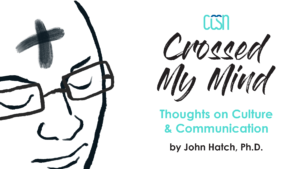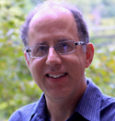 Crossed My Mind: Thoughts on Culture and Communication
Crossed My Mind: Thoughts on Culture and Communication
By John Hatch, Ph.D.
Eastern University
Column Description: As Christians, we are called to have the mind of Christ. This goes against the grain of our social and cultural conditioning. We seek personal or political advancement; Christ seeks the lost and the least. We grasp for cultural ascendency; Christ descends to the cross of love. This column is dedicated to thinking about culture and communication under the sign of the cross.
October 2021
The Paradox of Helpless Truth
I’m sure many readers will resonate when I say that the past few years have been very discouraging for lovers of truth. I have been astonished at the extent to which fellow Americans—and worse, many fellow Christians—entertain implausible falsehoods, resist believing verifiable truths, and prove immune to being convinced otherwise. Some are caught in a mindset where their tribe and its rhetoric are presumed right, and anyone who contradicts the party line of the day is presumed wrong, regardless of integrity and impartiality. Others are personally tethered to false or questionable ideas, and any attempt to correct these ideas is taken as an attack on their identity.
When humans assess claims, we do so within a complex web of beliefs and attitudes. If this interpretive web is riddled with falsehoods, fallacies, and inflated fears, refuting a false claim is like trying to douse a flaming branch in a forest fire. The truth, it seems, stands helpless amid the blaze.
This notion struck me during a recent talk at my university. A colleague in our philosophy department discussed the challenge of discerning truth in a world flooded with misinformation. He spoke of the need for patience in responding to those taken in by falsehood. He noted that we can expect a measure of suffering when sharing truth that contradicts someone’s belief system or identity. And, most tellingly, he alluded to “the helplessness of truth.”
Although my colleague didn’t expound on this phrase, I believe it captures something vital. Reality simply is; it can’t help being true. That’s why lying usually takes effort; it goes against the grain of things, including our neurological wiring to convey what we really think and feel. Still, in a corrupt and sometimes hostile world, we confront substantial pressures to deceive. Fortunately, if we make truth-telling a habit, we can hardly help but speak honestly. Moreover, if we deeply encounter the God who is Truth, our capacity to evade truth will be disarmed.
This phenomenon is evident in Scripture. The writer of Psalm 39 recounts how he tried to muzzle himself in the presence of wicked people, yet could not remain silent. “My anguish increased; my heart grew hot within me. While I meditated, the fire burned; then I spoke with my tongue” (Ps. 39:2b-3, NIV). Similarly, the prophet Jeremiah found himself compelled to speak the word of the Lord even when it brought him only grief. “But if I say, ‘I will not mention his word or speak anymore in his name,’ his word is in my heart like a fire, a fire shut up in my bones. I am weary of holding it in” (Jer. 20:9). Even the false prophet Balaam couldn’t help but speak God’s truth when confronted by the Almighty.
As the saying goes, “Truth will out.” Sooner or later, God’s words must be spoken. Injustice must be named. The pretensions of power must be exposed. The plight of the poor and oppressed must be given voice.
In his important treatise On Christine Doctrine, St. Augustine—fifth century Bishop of Hippo, formerly a professor of rhetoric— encouraged Christian ministers of his day to value eloquence, since it enables one to present truth winsomely and arm it against assault. But sometimes rhetoric fails. Sometimes the audience has no room for truth. Sometimes falsehood has power or propaganda on its side. And there are times when truth, in the person of its witness, can only suffer and die.
Christ embodies the helplessness of Truth. Rather than take up the sword, he surrenders himself to the Sanhedrin’s unwarranted arrest. When falsely accused by Judea’s religious leaders, he stands firm and makes no answer to their disingenuous questions. When asked by Pilate if he is laying claim to the Jewish throne, Christ answers, “the reason I was born and came into the world is to testify to the truth. Everyone on the side of truth listens to me” (John 18:37b, NIV). Yet these Roman and Jewish authorities have no place for Truth embodied in their midst. Perceiving Jesus of Nazareth as a threat to their political control, they have him crucified on false charges of sedition.
Nailed to the cross, naked and helpless, the Truth hangs between earth and heaven. There, he intercedes for humanity, forgives his enemies, and offers up his spirit. The Truth dies and is buried.
But . . . the truth will out! Death cannot silence him. The grave cannot hold him. His disciples see him. They talk with him, eat with him, and touch his risen body. In time, they go out as his witnesses, declaring that he is risen, the true King. Amid opposition and persecution, their message spreads like wildfire.
Here’s the paradox: in helplessness lies the hope of truth’s victory. Its strength resides in weakness; its wisdom in apparent folly; its triumph in naked trust. Could this be the hidden treasure entrusted to Christians who raise their voice in the marketplace of ideas?
If so, we can rest in hope, even as we struggle to defend truth in our churches, workplaces, friend networks, and the academy. Trusting in truth’s ultimate triumph, we can “die” to our “rightness.” Setting aside personal or professional pride, we’ll keep our minds and hearts open to reality that exceeds our knowledge and to people who are more than the sum of their errors. We’ll keep listening, learning, and forgiving.
When even the savviest persuasion fails, and falsehood wins, we can still take up our cross, follow the Master, and bear witness. The truth will set us free.


Comments 2
Great to see a new column by you “in print,” John. Thank you for this timely writing, encouraging us to stick with the truth in this difficult political climate, with Christ as our example.
Blessings,
Valerie
Thank you Valerie. It’s good to hear from you! Haven’t seen you in a long while.